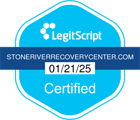Recovery from a substance use disorder is not a singular event but rather an ongoing, lifelong journey. After completing a treatment program for addiction, the transition back to everyday life can be challenging and filled with temptations.
Incorporating relapse prevention strategies into your recovery is an essential part of the process of maintaining lasting sobriety.
The following ten tips can help you stay on track after treatment:
- Build a Strong Support System
Surround yourself with people who understand your journey and support your recovery goals. This could include friends, family members, support groups, or a sponsor. Having a solid support network can provide encouragement when times get tough and serve as a reminder of your commitment to sobriety.
- Identify Triggers
Take time to recognize the people, places, and situations that may trigger cravings or temptations to relapse. Whether it’s stress, certain social settings, or negative emotions, knowing your triggers allows you to create strategies to avoid or cope with them effectively.
- Develop Coping Skills
Instead of turning to substances or addictive behaviors during challenging moments, explore healthier coping mechanisms. Some ways to cope during challenging times could involve:
- Practicing mindfulness and relaxation techniques
- Engaging in physical activity such as walking or running
- Pursuing hobbies such as painting, gardening, or photography
- Seeking professional therapy or counseling
- Create a Daily Routine
Creating a daily routine can provide structure and stability, reducing the likelihood of boredom or idle time that may lead to cravings. Fill your days with purposeful activities, set goals, and prioritize self-care to maintain a sense of balance and fulfillment.
- Practice Self-Care
Prioritize your physical, mental, and emotional health by adopting healthy lifestyle habits. These include:
- Getting enough sleep
- Eating nutritious meals
- Exercising regularly
- Practicing relaxation techniques
- Finding time for activities that bring you joy
- Seeking help if you begin to struggle
- Stay Mindful
Mindfulness involves being present in the moment and accepting thoughts and feelings without judgment. By practicing mindfulness, you can increase self-awareness, manage stress more effectively, and make conscious choices aligned with your recovery goals. Mindfulness fosters a deeper connection with oneself and cultivates a greater sense of inner peace.
- Avoid High-Risk Situations
Whenever possible, steer clear of environments or situations where you know temptation may be heightened. This may mean:
- Avoiding certain social gatherings where you could be tempted by drugs or alcohol
- Changing your route to avoid passing by familiar places associated with your addiction
- Politely declining invitations that could jeopardize your sobriety
- Celebrate Your Milestones
Acknowledge and celebrate your progress, no matter how big or small. Each day of sobriety is an achievement worth recognizing. Set milestones and reward yourself for reaching every single one of them. Some ways to celebrate your milestones include the following:
- Enjoying a special treat or meal with family or friends
- Going on an outing to celebrate your milestone
- Purchasing a small token that is meaningful to you
- Writing down your accomplishments in a journal
- Be Prepared for Setbacks
Recovery is not always a straightforward process. You may experience setbacks along the way. Instead of viewing relapse as a failure, see it as an opportunity to learn and grow. Reach out for support, reassess your strategies, and renew your commitment to sobriety. Embracing relapse as a learning opportunity empowers you to adapt, grow, and move forward with renewed determination.
- Stay Connected to Your Treatment Plan
Remember the tools and techniques you learned during treatment and continue to implement them in your daily life. You can stay connected to your treatment plan and reinforce your commitment to sobriety by:
- Attending all follow-up appointments
- Participating in individual or group therapy sessions
- Joining a recovery support group such as Alcoholics Anonymous (AA)
Relapse prevention is an essential aspect of long-term recovery, requiring ongoing dedication, resilience, and self-awareness. If you find yourself struggling with a substance use disorder, Stone River Recovery Center in San Antonio, Texas, can help. We offer residential treatment and detox services as well as outpatient mental health services and substance use treatment. To learn more about how we can help, please contact us today.








